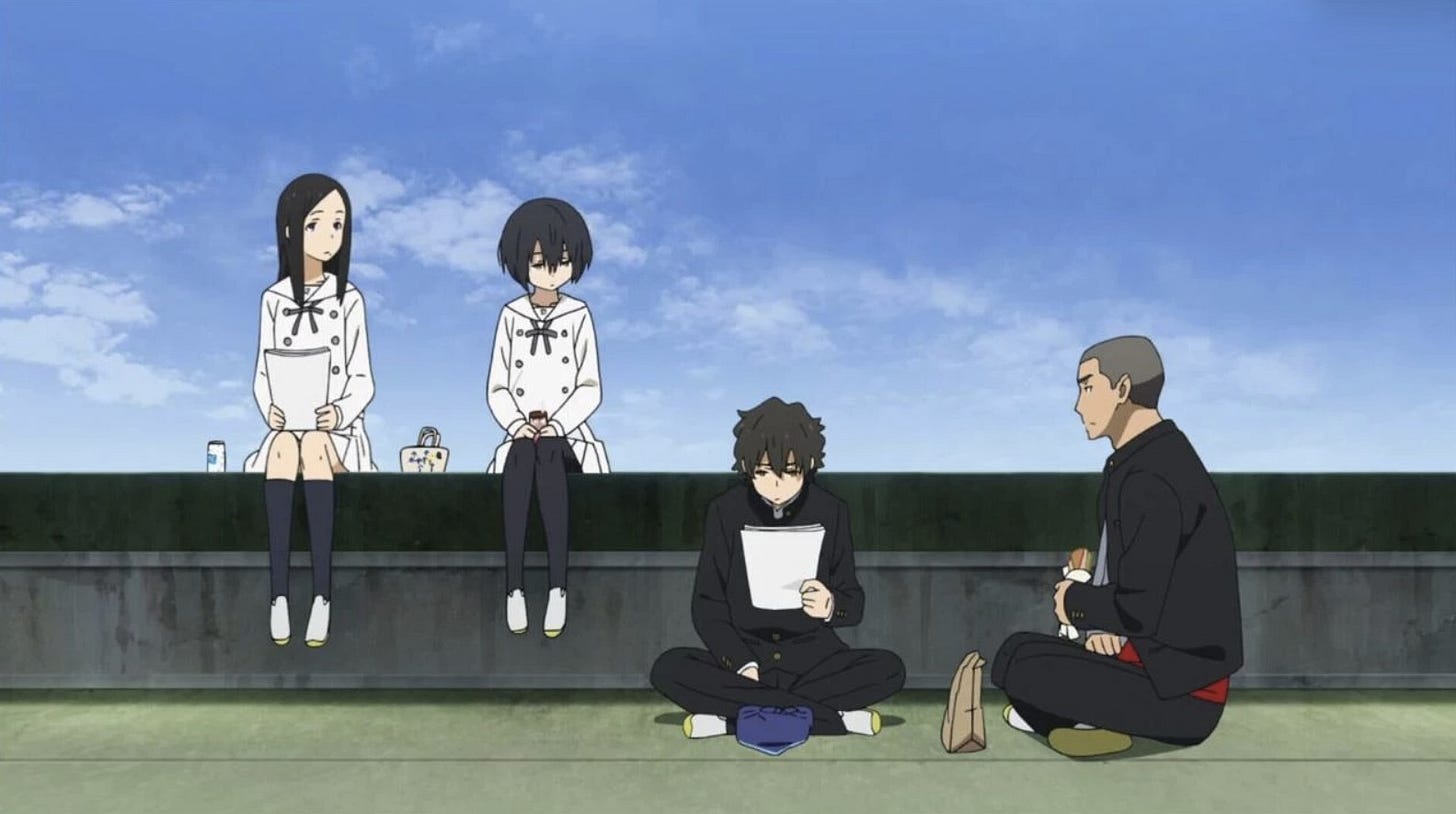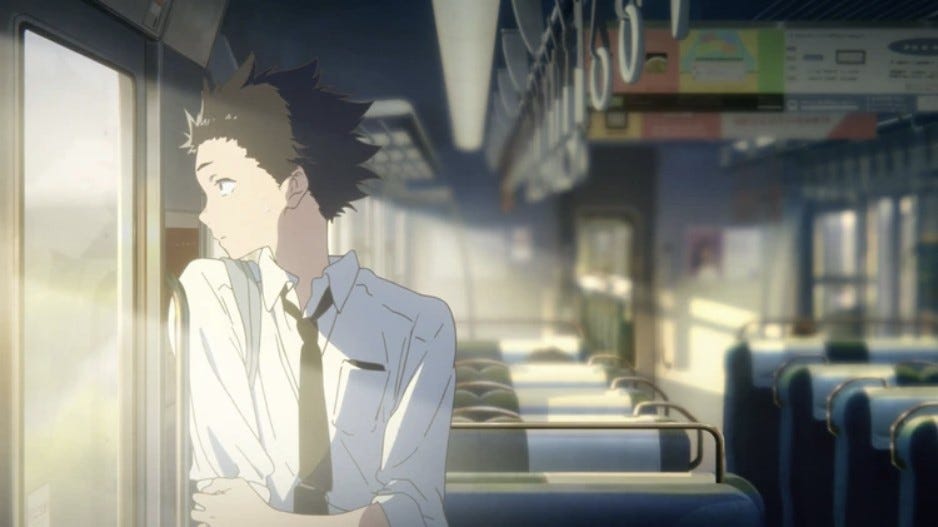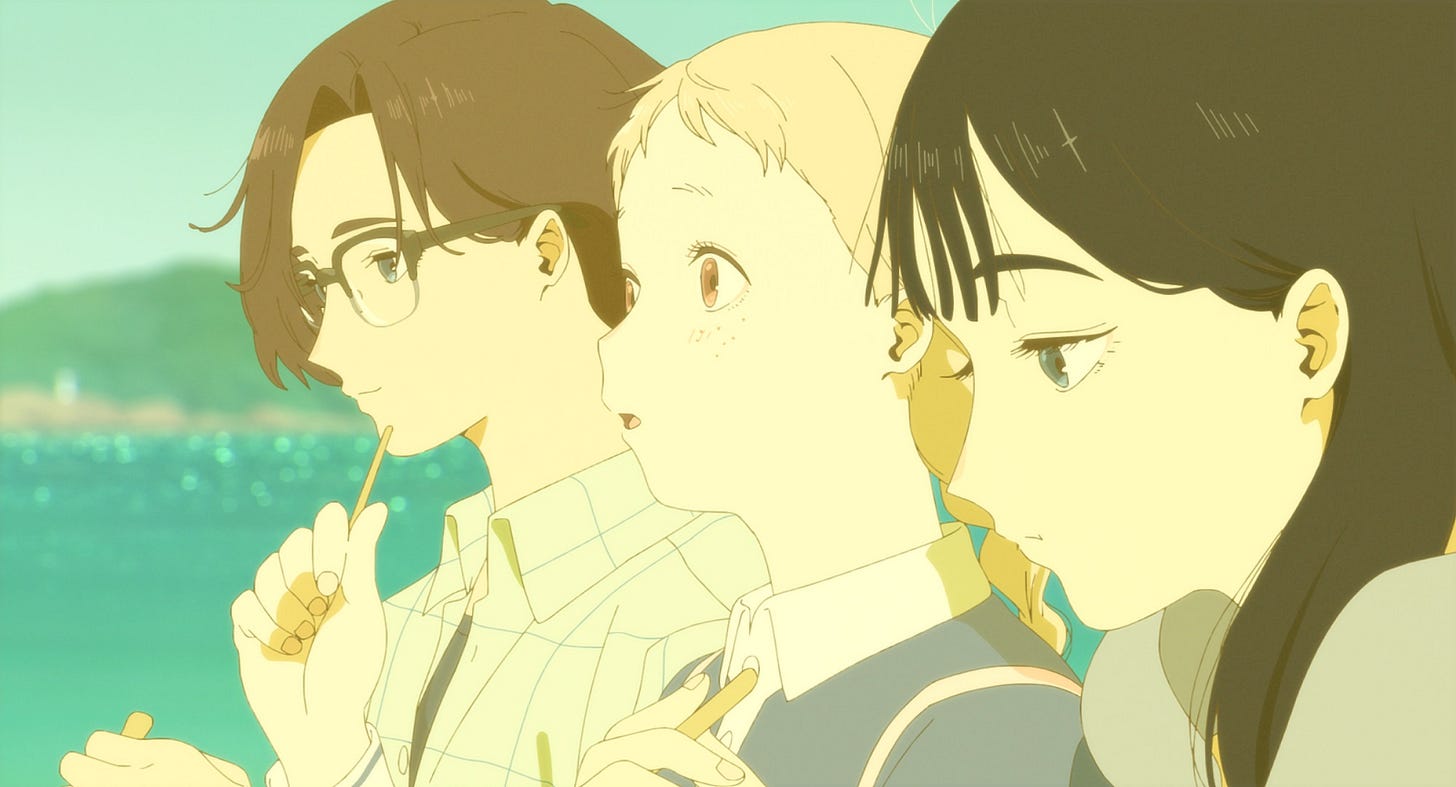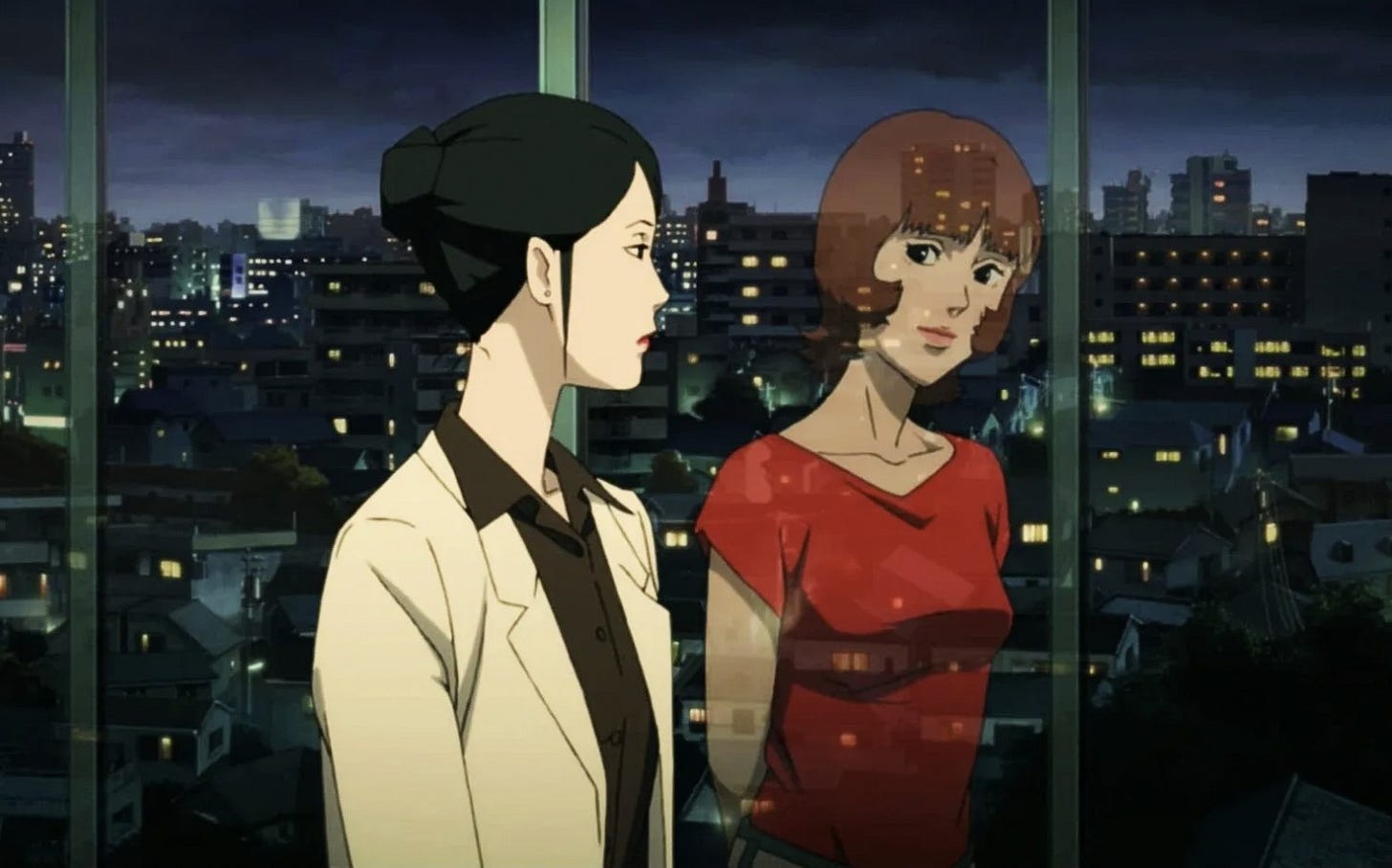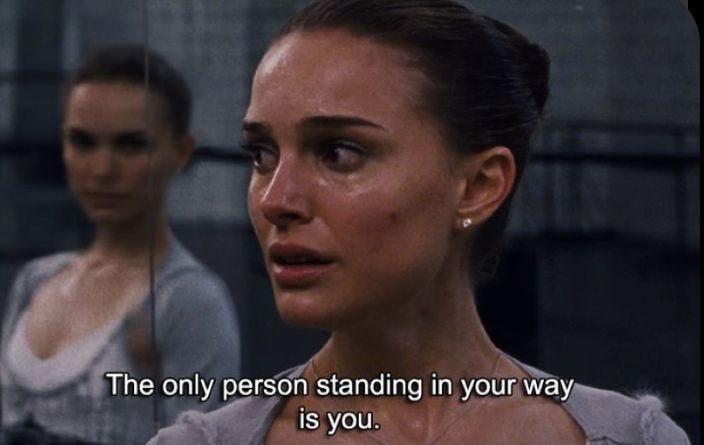Specialty Coffee: Izanagi Japanese Film Festival V
More or less film reviews, with a "tear scale" rating.
I’m at a very cool and vibrant conference hence why the usual Coffee Letter is replaced with some thoughts on the films from the Izanagi Japanese Film Festival. I know the Specialty Coffee is supposed to be something extra, but we’ll make an exception for this weekend, right?
Plus it’s quite an emotionally charged weekend and I’m trying to not overshare online and deal with my feelings offline — even though writing and throwing it into the void seems easier.
Thank you, and see you next week!
Got my tickets for Izanagi Japanese Film Festival in February. It was on the calendar. No room for anything else; and I’m so glad I planned it that way because it was the best weekend of the year so far. I mean, what’s not to love: spending all day at the cinema, scheduling short coffee breaks with friends or reading alone in cafes between films, questioning what identity is and what not. Basically a weekend made of all my favorite things.
The festival’s theme for this year was persona and the films played a lot with the idea of identity, ego and alter ego. The main reason why I was so excited for the festival: Satoshi Kon, one of my favourite directors when it comes to Japanese animated films and a master when it comes to the festival’s main theme.
But it was not all dark and pensive, some of the films were really wholesome and heartwarming — they picked the films really well to balance things out. But handkerchiefs were needed.
Let’s do this! Day 1:
The Anthem of the Heart / Kokoro ga sakebitagatterunda (2015), d. Tatsuyuki Nagai
A film about an imaginary fairytale turned reality turned musical. Our protagonist decides to never speak again after something shakes her world in her childhood, until she is forced to be part of a school committee in charge of a musical alongside three other students. As they work on the musical, our protagonists is slowly finding her voice and herself and the other three students’ stories come together.
It’s a film about the power of imagination. A lot is told through what our characters are not saying, even though in the end it’s a film about communication or the struggle to convey your feelings and get your words across. It’s a beautiful film, I enjoyed the animation style variation — showcasing the fantasy, and it surprised me.
Tear Scale: I cried.
A Silent Voice / Koe no Katachi (2016), d. Naoko Yamada
Another film focused on communication, but also a redemption story full of empathy. Ishida is bullying Nishimiya, the new girl in class because she is deaf, but soon the class turns on Ishida and he becomes the one bullied after Nishimiya changes schools. An older Ishida, tormented by his actions in the past, decides to see Nishimiya one more time.
The film deals with a lot of heavy themes, suicide included, but in the end it’s a film about compassion and self-acceptance. We get to meet a wide cast of characters and we understand them little by little. I loved how it balances the heavy drama with fun lighthearted moments full of humour. It’s a rollercoaster ride — and it even features one!
Tear Scale: Double the number of handkerchiefs cause I cried again!
The Colors Within / Kimi no iro (2024), d. Naoko Yamada
The newest film from the festival — which will officially be out in the cinemas on March 28th this year — is also the most heartwarming one, and a much needed breather from the heaviness of the first day of the festival.
It follows Totsuko, a high school student who sees the colours of other people, and who randomly decides one day to start a band with a former classmate (with the most beautiful colour) and a shy boy who loves music.
I quite enjoyed that it’s not a high stake drama type of film, but a much slower sweeter one that will leave you with a warm feeling and remind you how colourful life can be. Plus the animation was stunning and the score is impeccable! It’s just vibes, guys!
Tear Scale: Although the stakes are low, you might still cry.
Perfect Blue / Paafekuto buruu (1997), d. Satoshi Kon
How does one begin to talk about her new favourite film? And on that note — how does one talk about Satoshi Kon’s movies? The dude was a genius (and a huge inspiration to some of the greatest film directors *cough, cough* Darren Aronofsky *cough, cough* Christopher Nolan *done coughing*).
Perfect Blue follows Mima, a pop idol who switches from music to acting and has a crisis of identity in the meantime. It’s a film focused a lot on our true selves and who we are when we aren’t perceived by others.
It’s a film that seems like a normal thriller for the first half and then you get mindfuck after mindfuck after mindfuck that not only Mima, but us ourselves no longer know what’s real and what’s not. It’s a film very good at gaslight, gatekeep, girlboss.
I recommend going in blind — and maybe in future letters I will share some video essays on it because I know there are many, but I have yet to watch any.
Tear Scale: No tears, just shock.
Time for Day 2:
The Girl Who Leapt Through Time / Toki wo kakeru shoujo (2006), d. Mamoru Hosoda
First film of the second day and the first rewatch for me — I first saw this film when I was in high school and I loved it, but I feel like I loved it even more this time around. Maybe because I’m older and time feels different at 30 than it did at 15, right?
So… The Girl Who Leapt Through Time is about exactly what the title says it’s about! A film about going back in time and changing the past, improving her grades and eating the pudding that her sister ate the first time around. You know, the little things, until she realises that even these little changes could have a great impact.
It’s a fun film — it’s very natural, a well-written story that establishes its characters early on, featuring great dialogue. It’s not perfect by any means, but I enjoyed the blend of humour with the more serious moments. It does feel very YA though.
Tear Scale: I was bawling my eyes out by the end of it.
Millennium Actress / Sennen joyuu (2001), d. Satoshi Kon
The lighter film of the day is from none other than Satoshi Kon — I love when a director can make both very deeply dramatic films but also heartwarming films, with just as much depth.
Millennium Actress follows a documentary filmmaker who makes a film about a bankrupted studio and its most famous actress, Chiyoko Fujiwara, who accepts to give an interview after thirty years of being out of the public eye.
It’s one of his more normal stories, but the way the director plays with transitions is marvelous! Plus it celebrates the history of Japanese cinema by blending Chiyoko Fujiwara’s films with her memories.
Tear Scale: There might be crying, but there will definitely be a lot of laughter!
Paprika / Papurika (2006), d. Satoshi Kon
Last film of the festival just happens to be one of my favourite films ever — and it’s my second time seeing it in the cinema.
Paprika is a story about dreams and escapism — and the danger of living too much in either world and ignoring the real one. There’s a machine that allows people to share their dreams and Dr Chiba, a therapist, who uses it to help her patients until one day when dreams seem to be taking over the real world.
Paprika is… a lot. A surrealist rollercoaster that plays with duality and the fine line between imaginary and reality, subconscious and conscious. It’s better to experience it, trust me — and beware, the main theme song will be stuck in your mind for days.
Tear Scale: I don’t think you’ll cry, but I hope you’ll love it.
A special thanks to the friends who kept me company during the breaks between films.
I cannot wait for next year’s edition of the festival and I hope I convinced some of you to give Japanese animation a chance.
Our usual program will return next week.
Thank you for reading!





